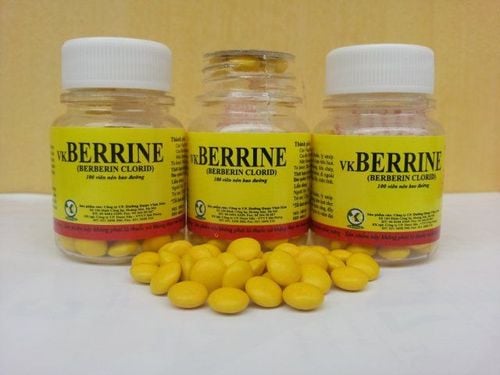This is an automatically translated article.
The article was professionally consulted by Dr. Le Thu Phuong - Department of Pediatrics - Neonatology - Vinmec Hai Phong International General Hospital.Digestive disorders are one of the common diseases in children. This is a disease that will be completely cured if it is treated in time. However, parents should not be subjective to prevent possible complications for children.
1. Causes of digestive disorders in children
Children between the ages of 0 and 6 years old, their resistance and digestive system are still weak, so they are easily attacked by pathogens such as bacteria, viruses, fungi, parasites... causative agents of gastrointestinal diseases. Antibiotics can be the cause of digestive disorders in children. When antibiotics enter the body, they not only kill harmful bacteria but also kill beneficial bacteria, causing an imbalance in intestinal ecology, leading to digestive disorders. Children can be disturbed when living in an environment with poor hygiene quality from contaminated water to food sources. In fact, complications from other diseases such as acute nasopharyngitis, otitis media, pneumonia, bronchitis... can cause digestive disorders in children. Once infected with these diseases, children often secrete sputum containing bacteria, instead of spitting out, children swallow, leading to intestinal infections, causing digestive disorders. Digestive disorders also occur in children with unreasonable diets. Fatty foods, sweets, sausages, hot dogs and carbonated drinks, soft drinks. These are all foods that are not good for the child's body, especially for the digestive system.
Có nhiều nguyên nhân gây rối loạn tiêu hóa ở trẻ
2. Symptoms of digestive disorders in children
Common manifestations of digestive diseases in children include:Vomiting This is a common condition in young children when the digestive tract is not yet complete. However, this situation will go away when the structure of the baby's digestive system gradually completes.
Constipation Constipation is very common in young children because the digestive system is not yet complete, especially when children eat foods that are difficult to digest: hard foods, too much fat, or hot proteins that are difficult to digest, .. It is easy to see that when children are constipated, they easily skip meals, anorexia makes the body not absorb the necessary nutrients and minerals, leading to malnutrition, rickets, and growth retardation.
Passing raw stool The imbalance between good bacteria and bad bacteria in the intestine is the cause of the condition of raw stool. Normally, the intestines of normal people have a symbiotic flora with 85% of good bacteria and 15% of harmful bacteria, it helps the process of digestion as well as absorption of nutrients and elimination of toxic substances. normal.
On the contrary, once the above ratio changes, it means that the beneficial bacteria decrease, the harmful bacteria increase, causing intestinal dysbiosis with common symptoms, such as: In addition to loose stools, raw stools, sometimes with mucus, may be accompanied by bloating.
Diarrhea Diarrhea is a common condition in young children. When diarrhea is profuse and prolonged, children are very susceptible to dehydration, loss of electrolytes, more dangerous, children can lead to death if not handled promptly.

Trẻ bị tiêu chảy dễ gây mất nước và điện giải, rất nguy hiểm
3. What to do to prevent digestive disorders in children?
Building a suitable diet Limiting greasy snacks, parents should cook at home to ensure clean, nutritious and safe food. Children should be taught to wash their hands thoroughly with soap before eating as well as how to eat in moderation and on time.The beneficial foods that parents should choose for their children are foods rich in fiber. Fruits and vegetables, whole grains, and whole grain products are all foods high in fiber. They play a role in holding and filtering food in the digestive system to get energy and nutrients, and push the remaining waste out.
Besides, parents should encourage children to drink lots of water. Providing a sufficient amount of water for the body each day can help dilute food, easy to move in the intestinal tract.
Practice scientific eating habits When eating, parents should remind children to chew food carefully. Chewing helps to break down food into small pieces and mix them with enzymes found in saliva. This makes it more palatable and easier to digest.
Exercise every day Exercise habits, daily movement can also help children eat well as well as help the digestive system work better. One thing to note is that children should not exercise vigorously right after eating.
Avoid causing stress and pressure to make children lose their appetite, inhibit digestion and absorption. Children need to be comfortable and enjoy eating.
When seeing that the child has abnormal symptoms, parents should take the child to medical facilities for timely examination and treatment. should not buy drugs or treat according to folk experience, to avoid unfortunate consequences.
Currently at Vinmec International General Hospital, pediatric patients are comprehensively examined by pediatricians, gastroenterologists with many years of experience and examined by gastrointestinal endoscopy to diagnose correctly. exact digestive disorders in children.
Vinmec International General Hospital is equipped with synchronous medical equipment, the most modern flexible endoscopic system today of Olympus Japan - a prestigious manufacturer of the world's leading quality. Along with that, the wire system and tools used during endoscopy are treated with absolute sterility according to international standards to avoid the risk of infection. The foot pedal irrigation system helps the doctor to take the initiative in pumping the patient's gastrointestinal tract.
In addition, to prevent gastrointestinal diseases that young children often suffer, parents should pay attention to nutrition to improve resistance for children. At the same time, add supporting foods containing lysine, essential micro-minerals and vitamins such as zinc, chromium, selenium, B vitamins,... snacks and less digestive problems.
Parents can learn more:
Why do you need to supplement Lysine for your baby?
The role of zinc - Guidelines for reasonable zinc supplementation
Please visit the website Vinmec.com regularly and update useful information to take care of your baby and family.














